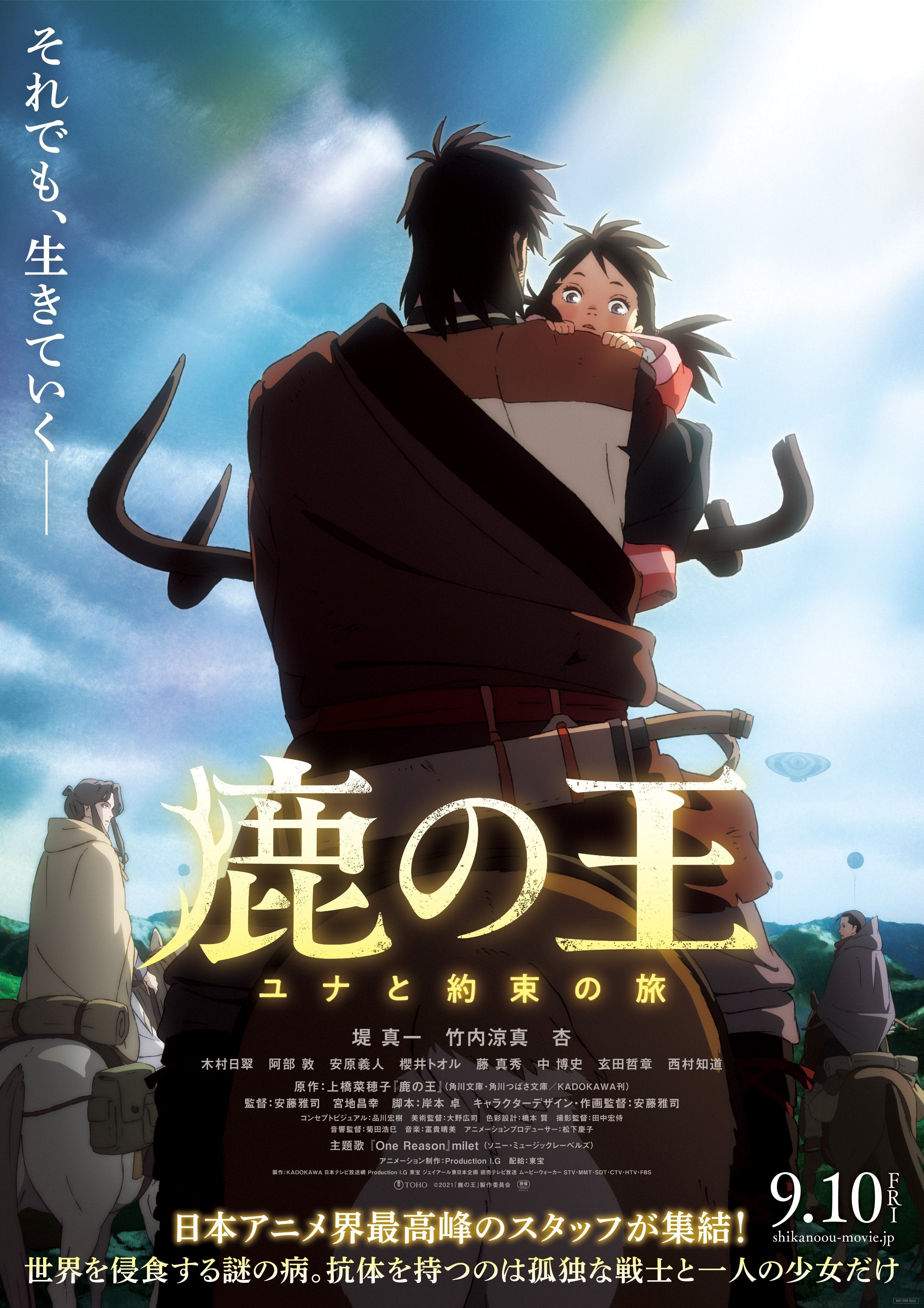A broken and defeated man rediscovers a sense of purpose in human connection but finds himself hunted by opposing sides each of whom see in him either salvation or destruction in Masashi Ando & Masayuki Miyaji’s fantasy anime adapted from the novel by Nahoko Uehashi, The Deer King (鹿の王 ユナと約束の旅, Shika no Ou: Yuna to Yakusoku no Tabi). Set in a fractured land of fragile peace, Deer King perhaps uncomfortably casts resistance as villainy while largely letting its oppressors off the hook but argues finally for turning towards the light rather than the darkness in a spirit of mutual forgiveness that permits a less fractious co-existence.
As a lengthy title roll explains, a war took place between the Aquafa and the Empire of Zol which resulted in a truce, partly because of a mysterious ”Mittsual” plague, the Black Wolf Fever, which frightened the Zolians out of sacking the capital. 10 years on, however, it’s clear Aquafa has become a vassal state living (literally) under the eye of the watchful Zolian emperor. The action opens in a salt mine where the enslaved are mercilessly exploited by their Zolian masters. “Work as if death spared you” one shouts out as an old man collapses, a younger, fitter one silently picking up his burden. As we’ll later discover this man is “Broken Antler” Van (Shinichi Tsutsumi), a lone survivor several times over and about to be so again as the mine is attacked by seemingly rabid dogs, one of them wandering into the prison where Van has been chained for helping the old man with a small child in its mouth. Van lunges at the dog which drops the child and bites his arm instead, the creature in a sense freeing him from the source of his oppression in breaking the chain which tied him to the wall before walking away leaving him bleeding only for Van to discover the bite has given him new power. Breaking free he takes the child with him as he ventures back out into the world.
Van has lost more than most in this war, in a sense orphaned, a living a ghost with nothing and no one to live for. He could so easily lean towards hate or resentful violence but is given new reason for survival in becoming a father to the little girl, Yuna (Hisui Kimura), who is like him a lone survivor. Yet others feel differently, the resurfacing of the plague a metaphor for the grief and anger existing among the Aquafa targeting as it does only the Zol who look upon it as a “curse” or else or rebellious plot, which it in fact is. The former elite of Aquafa are apparently intent on using the Mittsual, to which they believe themselves immune, to free themselves of Zolian control and regain their independence. A neutral scientist, Hohsalle (Ryoma Takeuchi), however, throws their plan into disarray in his conviction that Van’s blood, the blood of a survivor, may act as cure and vaccine. The Zolians need him to survive, but Aquafans would rather he didn’t.
Meeting his destiny head on, Van finds he has a choice: either embrace the darkness, accept the fear and the grief and the hate by using the Mittsual to target the Zolians, or allow Hohsalle to use his blood to find a cure. In the small, formerly nomadic, village in which Van finds a temporary home, they care nothing for politics and only want peace. They’ve begun intermarrying with the Zolians and live happily together while another man he meets along the way appears to be grateful for all the Zolians have done for them, which seems on one level a peculiar sentiment in welcoming their ongoing oppression. Yet salvation comes in a sense from re-embracing the Aquafan culture which has been taken from them, the cure not Van’s blood but his bond with nature something which all Aquafans once shared but was disdained by Zol. Zol can only survive by recognising Aquafa’s equality.
Van’s strange new power, dubbed “inside Out” literally connects him to every other living being in the land becoming one with the great confluence of nature and cosmos. “Blood ties matter not” he tells an embittered young woman realising that Yuna is not his biological daughter, she in turn learning to abandon her hate through the force of his love. He reflects on the memory of a deer who put himself at risk to save a foal, asking himself if that’s what it means to be a hero or if he merely had the means to do what anyone should and did what was asked of him. Where the cruel patriotism of the Aquafans and religious zealotry of the Zolians fail, the rationality of humanitarian science and simple human empathy win out. A sacrifice may in a sense be needed, but it’s not the one you thought it was. A tale of the redemptive power of love, The Deer King argues for forgiveness in the face of hate if perhaps uncomfortably suggesting the burden of peace lies with the oppressed.
The Deer King screened as part of this year’s Camera Japan
Original trailer (English subtitles)

